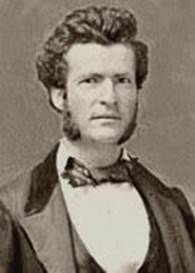
Click photo to enlarge
Most Iowans know that Samuel Clemens (later
known as Mark Twain) lived and worked in Muscatine and Keokuk in
the mid-1850s. But few know of his fondness for a precocious Lee
County girl while living there.
In July 1855, at age 19, Sam took a boat from Hannibal, Missouri
to Keokuk. His brother, Orion, owned the Ben Franklin Book and
Job Office downtown. Orion offered Sam work on his largest
project to date, the publication of the Keokuk City Directory.
The printing office was on the third floor of a four-floor red
brick building on Main Street. There was a book store on the
ground floor and a music school operated by a Professor Isbell
on the second floor. Sam earned $5 a week and free board at
Ivins House, perhaps the town’s best hotel.
After his day’s work was finished, Sam would sometimes play the
guitar or banjo, and sing comic songs in the print office. Orion
and his other apprentices would often join in. Professor Isbell,
hearing the ruckus, encouraged Sam and his comrades to enroll in
a singing class.
Sam’s outgoing personality, innate gallantry, and dancing skills
made him popular. Through Orion’s wife, Mollie, who was close to
Sam’s age, and her younger sister, Belle, he met a bevy of
girls. In letters, he mentioned his favorites including Ella
Patterson and Ella Creel, his own cousin. But one of Orion’s
neighbors, “the talented and brilliant” Ann Elizabeth Taylor,
was his primary interest.
Ann was born on January 9, 1840 when her family lived at West
Point, Iowa. However, they subsequently moved to Ft. Madison and
then to Keokuk. Ann’s father, Hawkins Taylor, had been a member
of Iowa’s first territorial legislature while at West Point. In
the 1850s, he was a Keokuk alderman and was later elected Mayor.
The Taylors’ home was within a block of the Stotts family, with
whom Orion Clemens lived during most of 1856, and in the same
neighborhood as the Creels and Pattersons. Sam had intimate
friends in both families. There is also some evidence the
Taylors entertained Sam at their summer property just north of
Keokuk, overlooking the Mississippi.
Annie Taylor was well read, musical, liked to draw, and shared
Sam’s ability to see the comical side of things. She was
something of a rebel, too, having “very irregular” attendance at
prayer meetings. She was known to have ambitions beyond
marriage, and was attending Iowa Wesleyan College in Mt.
Pleasant. Sam’s younger brother, Henry, who also worked at
Orion’s print shop, was taken with Annie’s younger sister, Mary
Jane.
Sam courted Annie down the locust-lined streets of Keokuk during
her school holidays. When she was away at school, they
corresponded regularly. Her letters were described as
“strikingly original and humorous.” They inspired Sam to write
about subjects he knew she, above all others, would appreciate.
One of his letters to “My Dear Friend Annie” was about the
swarms of bugs attracted by the gas light as he worked late in
the printing office at 2 a.m. He imagined a big “president”
beetle first buzzing at his flock of lesser insects, and then
joining them in church hymns.
Annie once wrote Sam from Iowa Wesleyan about the difficulty of
composing a paper. He responded “Ah, Annie, I have a slight
horror of writing essays myself. And if I were inclined to write
one, I should be afraid to do it, knowing you could do it so
much better…” She sent him a drawing of Mt. Pleasant, which he
jokingly referred to as “Mt. Unpleasant,” perhaps because the
town kept her from his presence.
What is unmistakable in Sam’s letters is his tenderness for
Annie Taylor. There was a tone of deference and modesty that
might surprise those familiar only with his later writing. When
there was a drought in correspondence from Annie, he gently
chided her in an attempt to renew the exchanges.
For a time, Sam’s mother, Jane, was concerned that he was headed
for marriage while still a pauper. However, the relationship
ultimately cooled and Sam appears to have abandoned his efforts
to woo Annie. A restless spirit caused him to leave Keokuk after
a year and a half. He continued to write his dear friend for a
time, but even that correspondence faded.
After attending Iowa Wesleyan for two terms, Annie completed her
studies in art and literature at Lindenwood College in St.
Charles, Missouri. She was an English instructor there for
several years. That was an outstanding accomplishment for a
young woman at the time. Annie married Frederick Cunningham, a
local man who became postmaster in St. Charles. The two moved to
California, where Frederick’s health failed and he died.
Annie came back to the Midwest, marrying Charles A. Cunningham
(possibly a relative of Frederick) and setting up a new
household in Carrollton, Missouri. The two had no children of
their own, but Ann served as a de facto mother to three whom she
had educated. During their years in Carrollton, Charles became a
judge of the probate court. Ann, however, fell into poor health
after age 35. It was said that, in her own home, she was
cheerful and a charming conversationalist. However, she was
unable to take part in any social life in the town during the
last 20 years of her life.
Ann died of pneumonia on January 23, 1916. Her friendship with
Sam Clemens had been fleeting and preceded his literary fame.
Still, this former Iowan thought enough of Sam to save his
letters in a Japanese-style lacquer box for 60 years.
--John Stuekerjuergen
|



